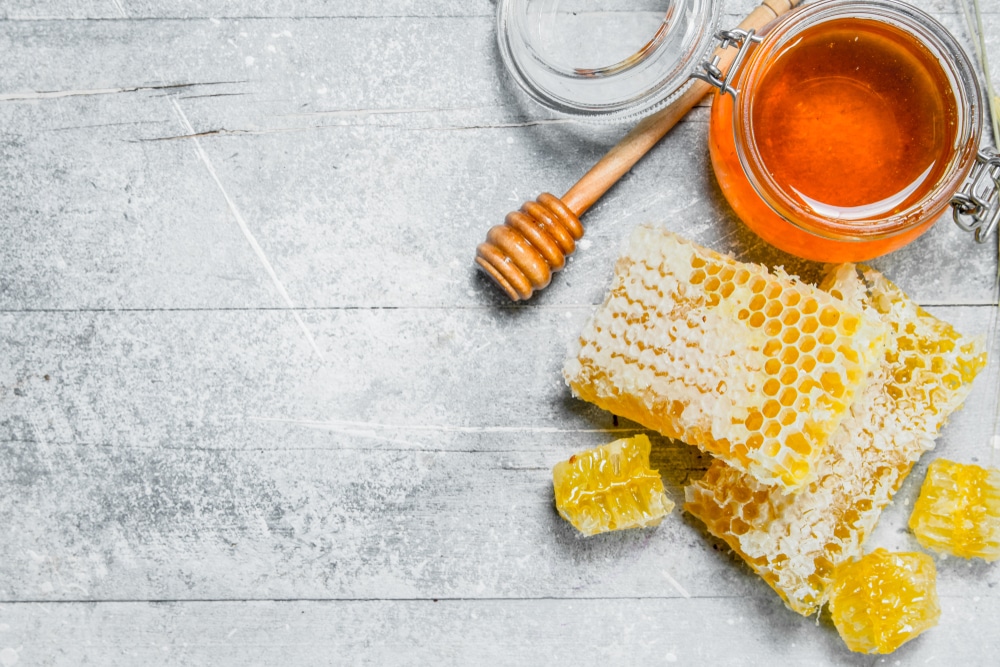You have obviously stumbled upon info about the dangers of added sugars. Eating healthy involves limiting your sugar intake just as much as taking vegetables, fruits, whole carbohydrates, and lots of water. So finding an alternative sweetener is important but might seem like an impossible thing to do. While there are many natural sweeteners like cacao, coconut sugar, or maple syrup, no two come close to each other as agave nectar and honey do. Both the two liquid sweeteners are great alternatives to refined sugar with amazing health benefits, but which is healthier? We take a closer look at the agave nectar vs honey differences, nutritional value, and benefits.
What Is Agave?
Agave nectar is syrup derived from the sweet sap inside the blue agave plant. The blue agave plant is native to the Americas and is the same succulent from which tequila is derived. After harvesting the agave nectar plants, the sap is extracted and then filtered. The filtered liquid is heated to break its components down into a simple sugar referred to as fructose.
The resultant liquid is concentrated into a syrup, bottled then sent out to stores ready for purchase and consumption. Agave nectar, therefore, goes through several processing steps before it is ready for consumption. Unlike honey, agave nectar is a great sweetener option for vegans who do not take honey.
The syrup is thinner than honey, and it is very sweet. The color varies from light to dark depending on the degree of processing. Dark agave nectar has a strong caramel taste; Amber agave has a medium intensity caramel taste while light agave nectar has a mild taste.
Agave nectar is fermented to make tequila. The syrup is a great sweetener for tea and cocktails. It can also be used in baking, topping for pastries and pancakes, and spreading for toast. You can also use it to prepare meat, poultry, or seafood dishes.
Read More: Healthy Alternative To Sugar In Coffee: Enjoy Your Cup Of Joe The Healthy Way!
What Is Honey?
Don’t we all just love honey? Honey is a liquid sweetener that is extracted from honeycombs. Honey starts as flower nectar that is harvested by bees. The harvester bees carry it to the hive, where they turn it into a simple sugar and store it in honeycombs. Beekeepers then harvest the honeycombs and strain them to get rid of any pollen or unwanted particles.
Bees are at the heart of honey making. And because of this fact, it is a non-vegan food. Vegans do not include this sweetener in their diets because they believe exploiting and harvesting honey from bees is immoral.
You can consume honey before any form of processing. Raw honey is, in fact, an available type. Certain honey brands are pasteurized to kill bacteria and prevent it from crystallizing to keep it spreadable.
If you are thinking about replacing sugar with honey, you must first crosscheck a few important facts. Is honey healthy? Honey, like any other form of sugar, can fit into a healthy diet in moderation. Is honey better than sugar? In some ways yes, in others no. Honey contains trace amounts of antioxidants and minerals, but it is still sugar. So how much you add matters.
Honey has many uses, from medicinal to skincare to being used in foods. The most common uses are wound healing, burn relief, soothing coughs, colds or sore throats, acne spot removal, skin cleansing, and cuticle moisturizing. It can be used as a salad dresser, fruit preservative, a spread for bread, topping for pancakes or waffles, and a sweetener for tea in the kitchen.
Agave Nectar Vs. Honey Calories
Both agave nectar and honey are calorific. 100 grams of agave syrup contains about 310 calories (1). On the other hand, 100 grams of honey contains about 300 calories (19). When compared to table sugar, both honey and agave syrup have a higher number of calories.
These sweeteners are also much sweeter than refined sugar, so you do not have to take too much of them. And given that sweet foods are easier to over-consume, you should watch your consumption. If you typically use one teaspoon of sugar for your tea, then just half a spoon of honey or agave nectar should be enough. When considering the number of calories in these sweeteners, honey is the better choice as it contains slightly fewer calories.
Intense sweat sessions, working weight loss tips, lip-smacking recipes come in one package with the BetterMe app. And all of it is at your fingertips, start transforming your life now!
Agave Nectar Vs. Honey Glycemic Index
Glycemic index is a value used to determine the relative ability of food to increase blood glucose level. This value is important for blood sugar management, especially for individuals who have diabetes. The lower the glycemic index of a food, the slower its ability to increase your blood sugar (9).
Foods low on the glycemic index scale release glucose steadily, while those high on the GI scale release glucose rapidly. So after an exercise, eating high GI foods is ideal. But if you have diabetes, then low GI foods are most suitable as the steady increase of blood glucose helps maintain good blood sugar control (10).
What is the agave nectar glycemic index vs honey? The GI breakdown of the sweeteners is as follows:
- Honey: 58
- Agave nectar: 19
So when you consider the glycemic index of these sweeteners, agave nectar takes the day. For this reason, individuals with diabetes may benefit from the low glycemic index of agave nectar. The American Hearts Association recommends consuming 6 teaspoons of added sugars for women and 9 teaspoons for men, which would include agave nectar and honey (6).
Agave Nectar Vs. Honey Sugar Components
Sugar is a carbohydrate meaning it consists of carbon, oxygen, and hydrogen atoms. There are 3 main simple sugars (monosaccharides): galactose, glucose, and fructose. Other types of sugars such as sucrose, maltose, and lactose are compound sugars (disaccharides) made by combining two simple sugars (2).
Honey contains mainly fructose (about 40%) and glucose (about 30%). It also contains trace amounts of other types of sugars such as maltose, turanose, sucrose, isomaltose, and galactose.
Agave nectar is primarily made of fructose with a percentage of about 75 to 90%. It also contains glucose. Much as fructose does not quickly raise blood sugar levels when overconsumed, it can lead to insulin resistance.
Fructose is metabolized in the liver, where it is used to replenish glycogen or in triglyceride synthesis. However, when the liver is overloaded, it turns the fructose into fat lobules, raising blood triglycerides. This accumulation of triglycerides contributes to insulin intolerance and reduced insulin sensitivity (8).
Since agave is mostly made of fructose, it is best to watch your intake. When it comes to sugar components, honey takes the cake. This is because it contains far less amount of fructose compared to agave.
Read More: Healthiest Sugar Substitutes: 9 Alternatives For Your Sweet Tooth
Agave Nectar Vs. Honey In The Kitchen
So, what do agave nectar and honey do for you when it comes to food? Agave is easily dissolved in liquids, be it a hot drink like coffee, a cold drink like iced tea, or a cocktail. So for cold drinks, cocktails, and vodka, agave nectar is more suitable.
Agave syrup is also one and a half times sweeter than refined sugar, so you use less of it. Recipes you can try include agave margarita, cashew yogurt, chocolate macaroon cake, or overnight oats with agave.
When substitute sugar with agave nectar, use the guidelines below:
- Use ⅔ cups of agave per one cup of sugar.
- Reduce liquids in the recipe by one quarter.
- Decrease the oven temperature of 25°F.
- Increase baking time by about a minute for every 15 minutes. So when using agave baking, time is longer than when you are using sugar.
You can use honey in hot drinks such as black tea or green tea. Because of its sweet taste and smooth texture, it is ideal for baking. You can also use it in marinades and spicy dishes. Recipes you can try include honey garlic chicken, honey – vanilla cookies, or granola bars.
To replace refined sugar with honey, do as follows
- Use half a cup of honey for every cup of sugar.
- Decrease oven temperature by 25°F to avoid excessive browning.
- When using over 1 cup of honey, reduce baking soda by ½ a teaspoon and liquids by ¼ in the recipe.
In the kitchen, honey takes the cake due to its unique taste and smooth gel-like consistency.
Health Benefits Agave Nectar Vs. Honey
Agave nectar and honey have a wide range of applications. These sweeteners are not just useful in the kitchen for food and drink preparation; they also have plenty of benefits that promote overall well-being. So, what are the benefits of agave nectar vs honey?
Health Benefits Of Agave Nectar
Agave may be better to use with drinks and cocktails, but what are the health benefits of agave nectar vs honey?
Low Glycemic Sweetener
Agave has a glycemic index of just 19. Meaning it does not quickly raise your blood sugar level. So if you have diabetes, a low GI sweetener like agave nectar is a better alternative to refined sugar.
Contains Essential Nutrients
Agave syrup contains sugar, carbohydrates and contains no fats or cholesterol. It also contains trace amounts of vitamin K, pyridoxine (vitamin B6), folate (vitamin B9), and riboflavin (vitamin B12). These B vitamins help promote cell health and help prevent infections.
May Help With Depression
The folate and vitamin K found in agave nectar provide mental health benefits. Research shows that folate may help ease the symptoms of depression by improving response to antidepressants (21). A higher intake of vitamin K is also associated with a lower presence of depression. Remember, however, that these vitamins are only found in agave nectar in trace amounts.
May Help Prevent Heart Disease
Agave syrup contains an important B vitamin, pyridoxine. It helps keep homocysteine levels low, thus reducing the risk of stroke and cardiovascular. Research shows that people with lower blood levels of pyridoxine have twice the likelihood of developing cardiovascular disease than those with higher vitamin B6 levels (3). Again, you won’t be able to rely solely on agave nectar to get your B6, because it is only present in small amounts.
Whether you’re looking to simply pep up your fitness routine, jazz up your diet with mouth-watering low-calorie recipes or want to get your act together and significantly drop that number on your scale – BetterMe app has got you covered! Improve your body and revamp your life with us!
Health Benefits Of Honey
Honey has for many years been embraced because of its high nutrient profile and many medicinal applications. Below are the top benefits honey has to offer:
Powerhouse Of Antioxidants
High-quality raw honey contains several essential antioxidants. They include flavonoids, phenolic acids, and organic acids (16). Antioxidants slow or prevent damage to body cells caused by free radicals.
When free radicals accumulate in the body, they cause oxidative stress, damaging the important structures in your cells, such as DNA. Too much oxidative stress increases your risk of developing conditions such as stroke, certain types of cancer, and rheumatoid arthritis. Damage to cells by free radicals also results in pathological changes linked to aging (7).
Research also suggests that the flavonoids found in honey may help lower blood pressure and prevent heart disease. The 3 major mechanisms by which these antioxidants prevent heart disease are increasing coronary vasodilation, preventing oxidation of Low-Density Lipoproteins, and decreasing the ability of platelets to clot (20).
Contains Nutrients
Honey is primarily made up of sugar, with most of it being fructose and glucose. It contains no protein or fat. The syrup also contains small amounts of essential nutrients such as riboflavin, calcium, magnesium, potassium, manganese, and niacin (17).
It is rich in phytonutrients which are components found in plants that protect the plant from harm. It is these phytonutrients that give honey its antimicrobial and antioxidant properties.
Given that most of the sugar in honey is fructose, you might wonder if honey is healthy. Overconsumption of fructose has been associated with various health issues. However, when taken in the right amounts, honey poses no risk.
Is Honey good for diabetics? When compared with refined sugar, pure honey is the better choice. Honey is way sweeter than sugar, so you need just half as much honey as the sugar you would use. It also is rich in antioxidants, and its glycemic index is just 50. So when taken in the right amounts, it is unlikely to cause a spike in blood sugar levels.
Soothing Sore Throats
Is your throat sore? Try a spoonful of raw honey instead of lozenges. Honey is an ancient sore throat household remedy whose wound healing and antimicrobial properties may help relieve inflammation (5). Just add two spoonfuls to hot tea or water with lemon.
Relieving Colds And Coughs
The magical golden syrup can also help suppress coughs, even more so for children with upper respiratory tract infections. Some studies suggest that honey is as effective if not more effective than medications such as dextromethorphan (4).
One or two spoonfuls should be enough. However, do not give honey to children under the age of 1 year. This is because it increases the risk of your child getting botulism caused by a bacteria called Clostridium botulinum found in raw honey.
Healing Wounds And Relieving Burns
Honey is used as a topical application to help heal wounds and relieve burns. It has been used to treat diabetic foot ulcers, a serious complication that can lead to amputation (18).
A meta-analysis of 26 studies on honey and wound healing showed that honey may be effective at healing wounds that have been infected after surgery and partial-thickness burns (15). The healing power of honey is thought to stem from its antimicrobial and anti-inflammatory properties.
Thought to be the most effective type of honey used to relieve burns is Manuka honey (11). The topical application of honey also helps treat skin conditions such as herpes lesions and psoriasis.
Treating Diarrhea And Other Digestive Issues
Honey contains prebiotic properties and thus helps promote a healthy gut. It nourishes the friendly bacteria in the intestines, which are key in digestion and overall health.
Sometimes, honey is used to treat diarrhea because of its soothing effect on digestion. Research shows that taking honey reduces the period of diarrhea in individuals with bacterial gastroenteritis (13). To help with diarrhea, take a teaspoon of honey or mix it in a drink that also contains electrolytes. Be careful not to take too much as excess sugar worsens diarrhea.
Honey can also help ease the symptoms of gastroesophageal reflux disease (GERD). Consumption of honey coats the esophagus and the stomach lining preventing the upward flow of gastric juice and food. Additionally, honey can help stimulate the regrowth of sphincter tissues, thus reducing the chances of acid reflux (12).
Has Antifungal And Antibacterial Properties
Honey is a natural antibacterial and antifungal agent. It has a low pH and contains glucose oxidase and hydrogen peroxide, meaning it can kill harmful microbes. Also, its chemical composition does not promote the growth of yeast or bacteria (5).
A type of honey called manuka honey is particularly popular for its use in the medical setup. Research shows that this honey variant can kill pathogens such as Escherichia coli, H. pylori, or Staphylococcus aureus (14).
With the health benefits of blue agave nectar vs honey, honey wins the battle. Honey has several more robust health benefits than agave syrup.
The Verdict – Which Is Healthier?
Both agave nectar and honey are great natural substitutes for refined table sugar. But if you are vegan and do not take honey, agave nectar is the sweetener for you. Also, if you have diabetes, agave may have the upper hand because of its low glycemic index.
However, honey has more potential health benefits than agave. It is an antioxidant powerhouse, has antimicrobial properties, and several medicinal uses, including suppressing coughs, wound healing, relieving burns, and soothing sore throats. Also, the lower fructose level of honey makes it the better choice because overconsumption of fructose can be detrimental to your health.
Agave is also more processed than honey. And unlike agave, honey does not need to undergo any form of processing before consumption. So, it is best to buy pure and raw honey that has not been pasteurized.
Conclusion
When it comes to agave nectar vs honey vs maple syrup, all sugars should be consumed in moderation. Sugar consumption is something that should be done with great caution. While it has some benefits, consuming too much of it could be counterproductive to your health. However, natural sugars are ideally safer and healthier than added or processed sugars.
Agave nectar and honey are both wonderful natural substitutes for granulated sugar. Both have health benefits that could be tailored to individual needs. So you should choose depending on what your health and fitness goals are. But remember, moderation remains key, regardless of the choice you make.
Take up a challenge and try this 20-min Full Body Workout At Home to get a snatched body.
DISCLAIMER:
This article is intended for general informational purposes only and does not address individual circumstances. It is not a substitute for professional advice or help and should not be relied on to make decisions of any kind. Any action you take upon the information presented in this article is strictly at your own risk and responsibility!
SOURCES:
- Agave Nectar (2021, usda.gov)
- Are certain types of sugars healthier than others? (2019,health.harvard.edu)
- Dietary Vitamin B6 Intake Associated with a Decreased Risk of Cardiovascular Disease: A Prospective Cohort Study (2019, ncbi.nlm.nih.gov)
- Effect of honey, dextromethorphan, and no treatment on nocturnal cough and sleep quality for coughing children and their parents (2007, pubmed.ncbi.nlm.nih.gov)
- Evidence for Clinical Use of Honey in Wound Healing as an Anti-bacterial, Anti-inflammatory Anti-oxidant and Anti-viral Agent: A Review (2013, ncbi.nlm.nih.gov)
- Foods Containing Added Sugars (2018, heart.org)
- Free radicals, antioxidants, and functional foods: Impact on human health (2010, ncbi.nlm.nih.gov)
- Fructose, insulin resistance, and metabolic dyslipidemia (2005, ncbi.nlm.nih.gov)
- Glycemic index and glycemic load: measurement issues and their effect on diet-disease relationships (2007, pubmed.ncbi.nlm.nih.gov)
- Glycemic index for 60+ foods (2020, health.harvard.edu)
- Health Benefits of Manuka Honey as an Essential Constituent for Tissue Regeneration (2017, pubmed.ncbi.nlm.nih.gov)
- Honey, Propolis, and Royal Jelly: A Comprehensive Review of Their Biological Actions and Health Benefits (2017, ncbi.nlm.nih.gov)
- Honey: its antibacterial action in the treatment of gastroenteritis (1985, pubmed.ncbi.nlm.nih.gov)
- Honey: its medicinal property and antibacterial activity (2017, pubmed.ncbi.nlm.nih.gov)
- Honey as a topical treatment for wounds (2008, pubmed.ncbi.nlm.nih.gov)
- Identification and quantification of antioxidant components of honeys from various floral sources (2002, pubmed.ncbi.nlm.nih.gov)
- Novel Insights into the Health Importance of Natural Honey (2015, ncbi.nlm.nih.gov)
- Practical considerations of using topical honey for neuropathic diabetic foot ulcers: a review (2008, pubmed.ncbi.nlm.nih.gov)
- Raw Honey (2021, usda.gov)
- The Potential Role of Honey and its Polyphenols in Preventing Heart Diseases: A Review (2010, ncbi.nlm.nih.gov)
- The Role of Vitamins and Minerals in Psychiatry (2008, ncbi.nlm.nih.gov)




















